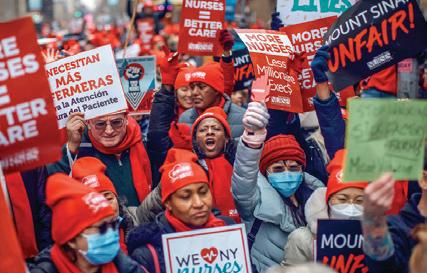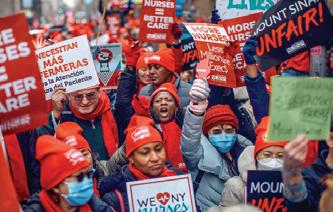
2 minute read
Red Hook
Continued from page 3 room there are 300 people sleeping and the beds are hospital-type beds.”
Fonseca added migrant men are concerned about the cold at the Red Hook facility despite the city’s claims of a heated, temperature-controlled structure. He said many are not used to the frigid New York City winter, with some suffering from pneumonia since arriving.

David Ramirez, another Venezuelan migrant, said each resident was initially assigned their own space at the Watson Hotel, although they began sharing rooms as more asylum seekers were moved in later on. A video of the Red Hook facility was shared to reporters showing rows of cots without privacy or partition.
Residents on certain floors—like Ramirez—said they are still allowed to reenter the Watson Hotel, but many will soon be locked out. A significant number of the facility’s staff are bilingual and can communicate with Spanish-speaking residents, including many African migrant men.
“The problem [with being in Brooklyn] is it would take 25 minutes getting here…some have just arrived here and just gotten jobs,” said Ramirez in Spanish. “We want to be able to take care of ourselves, we want to work, the opportunity to work. These are all things that would jeopardize our efforts to work towards freeing ourselves from being dependent on others. It’s not that Brooklyn is so terrible, but what we don’t see is that we would be able to continue to work towards making ourselves independent if we were out there.”
Police were called to the Watson Hotel on Sunday during the standoff due to disruption from outside groups, according to the city. But both Fonseca and Ramirez said the movement was organized by the migrant men themselves, electing representatives to speak on their behalf. The local activists present denied involvement and interference outside of translation services and mutual aid.
Despite the standoff, the migrant men expressed their gratitude to both the city and its residents.
“So far they have really treated us very special, we have a lot of support, that is why they are coming––they are arriving now,” said Fonseca. “There are neighbors from here, from the Manhattan community, who are supporting us, bring- ing food, meals, supplies. Everyone is very attentive to us in that regard.”
“I want to thank the people of the state of New York because they have helped us tremendously,” added Ramirez. “They’ve assisted us when in other places we did not get that. But personally, I am a person who wants to work. I can’t walk very much and they say that at the site in Brooklyn I would have to walk at least half and hour to 25 minutes to get to anywhere”
Tandy Lau is a Report for America corps member and writes about public safety for the Amsterdam News. Your donation to match our RFA grant helps keep him writing stories like this one; please consider making a tax-deductible gift of any amount today by visiting https://bit.ly/amnews1.









